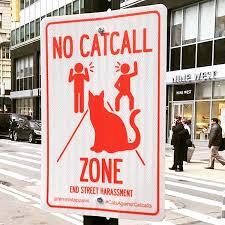Should catcalling be illegal in Australia?
“Hey beautiful”
“What’s up girl?”
“Looking good”
“Damn!”
“Nice rack”
Are comments like these ‘playful banter’ or is it sexual harassment?
Many women the world over experience incidents of this type of catcalling on a regular basis. Studies have shown these objectifying experiences occur from once a month to more severe circumstances of numerous times per day. Catcalling transcends race and culture. It can happen to women in their 40s plus and often starts when girls are in their early teens.
In a video taken on how prevalent street harassment is a woman was recorded walking silently through the streets of New York. In the video this woman was catcalled over 100 times in the course of only 10 hours.
How do Australian women compare when it comes to objectifying experiences? ABC News Australia did its own research in partnership with the Australian Catholic University and found that the 81 women in Melbourne studied experienced objectification approximately 3.69 times over the week or once every two days. Catcalls and wolf-whistles made up 11 per cent of the experiences, while 10 per cent were outright sexual remarks.
What is catcalling?
The Women’s Republic defines catcalling as a “term referring to when a man whistles, yells, hollers, or makes a comment to a woman in a sexual manor.”
These unsolicited sexual comments made to women in public, is also referred to as street harassment.
According to a 2015 Australian Institute report, 87 per cent of Australian women experience sexual harassment in their lifetimes. The harassment the report identifies ranges from “catcalling and wolf-whistling to more severe forms such as groping and stalking.”
Catcalling is not just a normal part of the experience of being a woman. Even though Senator Malcolm Roberts seems to think otherwise with his comment: “although some people might consider a wolf-whistle “sexual harassment,” “some girls” quite enjoy being whistled at, and have even been known to smile in response.”
Catcalling is harassment that has psychological and emotional impacts. The ABC News research cited above found that the objectifying experiences of the women studied resulted in an increase in self-objectification and greater body shaming, both of which have been linked to poor mental health such as disordered eating and depression. Being constantly told what people think of your body is not only annoying, as the Daily Telegraph describes it can be exhausting.
Is catcalling illegal?
France is currently in the process of deciding whether street harassment like catcalling should be made illegal. In Belgium, Portugal and New Zealand it already is.
According to Legal Aid NSW, sexual harassment is covered by state and federal discrimination laws.
The legal definition of sexual harassment has two parts both of which must occur before it is considered sexual harassment. First, it must be “unwelcome sexual behaviour” and second it is reasonable that the person would “feel offended, humiliated or intimidated by the behaviour.”
However, it must occur in one of the following places for it to be considered sexual harassment.
- At work,
- At school.
- When buying or selling goods or services (i.e. at a restaurant, hailing a taxi),
- When looking for a place to live or booking a hotel,
- At a social or sporting club,
- When dealing with a government employee, and
- When looking for a job.
People who defend catcalling claim that it is actually the woman’s fault and she “provokes” that type of response from men by wearing skimpy clothes. By presenting herself in a provocative way, they say it sends the message that it is okay to sexually harass her.
That is the same fraught thinking that women have been fighting against with regards to rape and sexual assault for decades. Having a law that makes catcalling illegal will be one way to send out the message that men need to be accountable for their actions and stop blaming women for their lewd behaviour.







